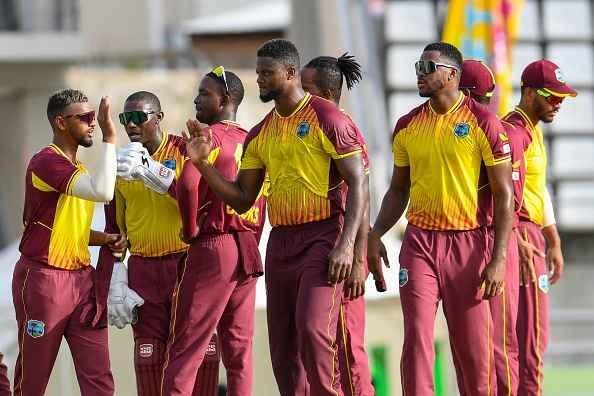When Fire in Babylon, Stevan Riley’s documentary about the glory years of West Indies cricket, was released in 2010, one of the promos had Sir Vivian Richards saying: “It’s history you won’t forget.” But as that era of four-pronged pace attacks, cavalier batting and blackwashes turns sepia-tinted in our minds, the new reality is especially jarring. West Indies cricket has been in the doldrums for decades, but failure to qualify for the World Cup for the first time marks a new low. Just when you thought that things couldn’t get much worse, defeats to Zimbabwe, the Netherlands and Scotland have ensured that some of the world’s leading white-ball cricketers will watch the World Cup in India from their living room couches.
The easiest thing in the world would be to rant at the present-day players who have “disgraced” the legacy. But what purpose does that serve? A decade ago, when Kieron Pollard, then the most wanted face for T20 franchise leagues around the world, was asked about the West Indies’ cricket tradition, and snide comments about his ability from former players, he was in no mood to be diplomatic.
“I’ve never seen a great West Indies team,” he told the journalist. “For me, that’s just words.” He had a point too. Pollard was born in 1987, the year when Courtney Walsh’s refusal to run out Pakistan’s Saleem Jaffar for backing up too far cost West Indies a place in the World Cup semi-finals for the first time.
By the time Pollard was a teenager, West Indies were being hammered 5-0 in a Test series in Australia. Their only World Cup semi-final since 1983 came in 1996, and they have seldom even come close since. So, before you train both barrels at Shai Hope, Jason Holder and others in the current squad coached by Darren Sammy, accept that the decline began even before some of them were born.
Accept too that in common with many other struggling teams – Zimbabwe were one not long ago – cricket administration in the region has often been a disaster. In his autobiography, published many moons ago, Richards wrote: “It just burns me up that sport is being run by a bunch of duffers. It is sad that the lowest achievers want the biggest jobs when they retire…”
Not to tar everyone with one brush, that but that has often been the story over the past three decades. Incompetent board chairmen insulting national team stars on social media, handing out lucrative contracts to foreign coaches of dubious quality, and creating a toxic atmosphere where leading players felt safer taking the freelance route to fame and riches.
- Also Read: West Indies Cricket Heads for Rock Bottom
Less than a year before he retired during the 2007 World Cup, Brian Lara had spoken of how comical it was to expect discipline and other qualities from players when the board didn’t set the right example. “It comes from the top” was the gist of his message. During that tournament, Lara had been involved in a couple of slanging matches with Colin Croft, the one-time pace ace who was then an outspoken and caustic critic of the side.
Croft, like many others of his generation, felt betrayed by what he saw as the casual attitude of some of the players. Lara, on his part, felt that the constant in-our-day diatribes didn’t help the team to move forward. Other countries have tried to strengthen traditions by getting former players involved on occasions like handing over caps to debutants. For Australia, the baggy green has almost mythical qualities. Even India have of late taken such ceremonies far more seriously, with the likes of Sunil Gavaskar handing out Test caps.
In the Caribbean, there seems to be a fracture between generations. Recently, in response to Carl Hooper, a former West Indies captain, expressing concern over the team’s plight, Holder spoke of how the team disregarded outside voices. There was just one problem. Hooper is an assistant coach with the team.
Some greats of the past, like Michael Holding, have withdrawn totally. Holding, who now lives in the Cayman Islands, didn’t even watch the World Cup Qualifiers. His views on Pollard and the T20 generation have been documented often enough, and there is little love on either side.
Remember too that West Indies, as an entity, come together just for cricket. Usain Bolt ran in the colours of Jamaica. Hasely Crawford won 100m gold a generation before Bolt while representing Trinidad and Tobago. An Indian kid grows up dreaming of wearing the national team shirt, just as an Australian child with cricket dreams imagines singing Under the Southern Cross after a World Cup or Ashes victory. National pride is the most powerful of motivators.
In the case of West Indies, it was the leadership of Sir Frank Worrell, Sir Garfield Sobers, Sir Clive Lloyd and Richards that made generations of players rally behind the concept of a team representing vastly different islands and territories. Worrell, for example, was as much as statesman as he was a cricket captain – a giant among men. You simply cannot expect a Hope or Sammy to have the same impact.
Whatever his criticism of the current state of West Indies cricket, Holding has always been steadfast in his belief that the sport, like life, is cyclical. Sooner or later, West Indies cricket will rise again, as they did briefly with two T20 World Cup victories in 2012 and 2016. They may never be a Test force again, and may make up the numbers in 50-overs cricket – however long that format survives – but T20 offers the perfect platform for a revival. For even that to happen, though, stakeholders – players past and present, administrators, and fans – need to start singing from the same sheet. The constant sniping and bickering has helped no one.
Also Read: Holder stresses importance of building strong structures to halt West Indies decline




